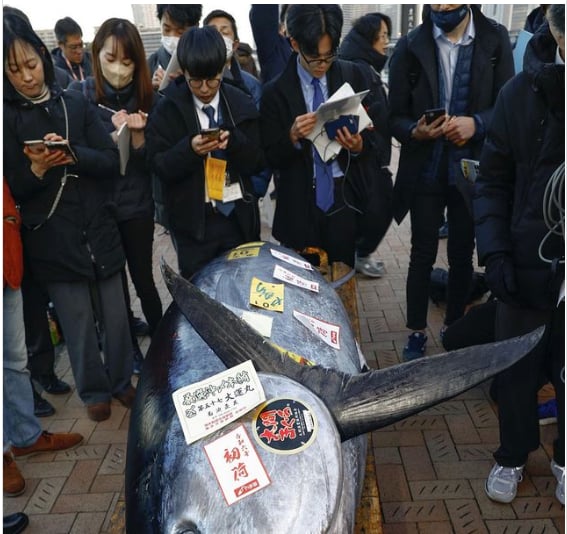June 12, 2025 | 17:21 GMT +7
June 12, 2025 | 17:21 GMT +7
Hotline: 0913.378.918
June 12, 2025 | 17:21 GMT +7
Hotline: 0913.378.918

The price paid for the bluefin tuna was three times the final amount of last year’s fish, and the fourth highest since records started being kept in 1999.
Something fishy just happened in Japan—but we don’t mean anything suspicious.
A huge bluefin tuna was sold at Tokyo’s largest fish market for a whopping 114.2 million yen, or $788,440, Bloomberg reported on Thursday evening. The first-day-of-business auction has become something of a new year’s tradition in Japan. This year, the 525-pound fish went to the seafood wholesaler Yamayuki and the sushi-restaurant company Onodera Group.
“If we were going to do it, we wanted to win,” Yukitaka Yamaguchi, the president of Yamayuki, told Bloomberg about bidding on the fish.
The price paid for the bluefin tuna was three times the final amount of last year’s fish, and the fourth highest since records started being kept in 1999, Hiroki Matsushita, a Toyosu fish market official, told Bloomberg. The fish, which was caught off the coast of Aomori prefecture, will be served at the Michelin-starred Onodera in the Ginza district of Tokyo.
The Onodera Group has been the top bidder at the fish auction for the past four years, but this year it paid more than ever since the pandemic began. And while almost $800,000 is a hefty price tag for a fish, it doesn’t even come close to what the sushi-restaurant group Kiyomura paid in 2019—an outstanding $3.1 million.
The price offered this year may be reflective of Japan’s bouncing back from the worst of the pandemic. Covid restrictions have been lifted and more locals and tourists alike are packing restaurants throughout the country, Bloomberg noted. The number of visitors has already returned to pre-pandemic numbers, with more than 2 million tourists entering Japan each of the past six months, according to the country’s National Tourism Organization.
Now, those visitors looking for a little good luck to start the year will likely flock to Onodera, hoping to get a taste of the bluefin tuna, which is said to be an auspicious fish. Unfortunately for those of us stuck stateside, while the Onodera Group used to export some of the pricey fish to America, it’s since closed its New York City location. While it does still have spots in Los Angeles and Hawaii, there’s no word yet on whether they’re getting some of the prized fish to serve to diners. We bet that people there, though, would similarly be more than happy to pony up for some of the Japanese delicacy.
(Bloomberg)

(VAN) As of Friday, a salmonella outbreak linked to a California egg producer had sickened at least 79 people. Of the infected people, 21 hospitalizations were reported, U.S. health officials said.

(VAN) With the war ongoing, many Ukrainian farmers and rural farming families face limited access to their land due to mines and lack the financial resources to purchase needed agricultural inputs.

(VAN) Vikas Rambal has quietly built a $5 billion business empire in manufacturing, property and solar, and catapulted onto the Rich List.

(VAN) Available cropland now at less than five percent, according to latest geospatial assessment from FAO and UNOSAT.

(VAN) Alt Carbon has raised $12 million in a seed round as it plans to scale its carbon dioxide removal work in the South Asian nation.

(VAN) Attempts to bring down the price of the Japanese staple have had little effect amid a cost-of-living crisis.

(VAN) Fourth most important food crop in peril as Latin America and Caribbean suffer from slow-onset climate disaster.